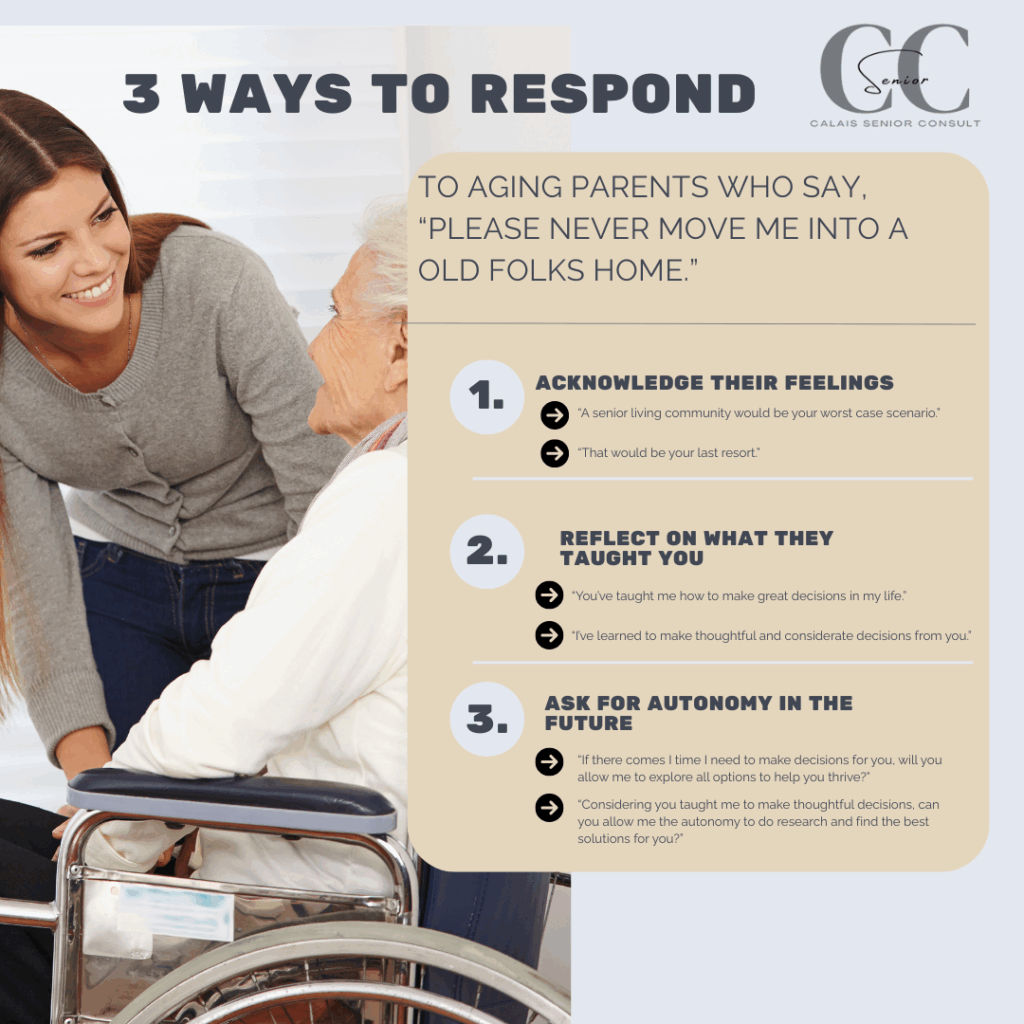There is nothing more traumatic and stress-inducing than an adult child who has promised their aging parent to “never put them in a home”, only to realize 10 years later, they can no longer be that primary caregiver.
I’ve seen it many times, adult children come in to explore options for their parent who, surprisingly, started showing signs of Dementia, or out of the blue was diagnosed with a progressive disease. The adult children look at me with stress in their eyes, anxious, trying to learn the information, but deep down feeling incredibly guilty for even considering assisted living or memory care. As I reach across and put my hand on their shoulder and remind them, “You made a promise, not knowing what the future held. And your parent made a request, not knowing what the future held. You can only do what’s best right now, in the situation you are in.”
So now that we know why I find it so important to educate adult children on this topic, lets dive into how we can respond, respectfully to our aging parents when they try to get us to promise to “never put them in an old folks home.”

Acknowledgement of their feelings
When anyone of any age is worried about something and shares their worries with you, it’s a great practice to try to acknowledge their feelings with empathy. Try to put yourself in their shoes and feel what they are feeling. Try and see the world through their eyes in that moment.
When we try to not only see their perspective but believe in their perspective, that builds connection. They feel like you see them. They feel heard and understood.
Here are some examples you can say when a senior says, “Please promise you won’t put me in one of those old folks homes.”
- “That would be your worse case scenario”
- “Assisted Living would be your last resort.”
- “Your ideal way to age with dignity is to have me take care of you.”
- “An assisted living would be your plan z, if nothing else worked.”
You can see with each of these examples of responses, I’m trying to tap into how a senior might be feeling in that moment, and what they truly are thinking and not quite saying. When we learn how to show empathy with people, and learn the skill of reflective listening, we start to excavate the unsaid. The things seniors can’t quite articulate to us, but are trying to say.
Reflect on what they taught you
After acknowledging their wishes, it’s helpful to reflect upon the skills your aging parents have taught you in their lifetime. My intention with this step is truly to help put our aging parents’ minds at ease, while recognizing and acknowledging that they, as the parents, have taught us kids well!
Here are some examples of how to reflect back on what your parents taught you about decision making.
- “You’ve taught me to make great decisions.”
- “Because of your decision-making, I’ve learned to make great decisions as well.”
- “You’ve taught me to be thoughtful and considerate when I make decisions.”
- “You’ve taught me to me a thoughtful and cautious decison maker.”
Again our focus is on reflecting what they taught us. To truly help remind them that THEY have taught us to be sound decision makers. They have shown us the way of making good decisions, we have learned from them.
Ask for autonomy in the future
The last thing I want adult children to do, is to get stuck in a corner of making parents a promise that we aren’t 100% sure we can keep. The goal of asking autonomy for the future isn’t to say, “no we won’t honor your wishes.” But instead I hope to communicate that, “I hear your wishes, we will try and honor them, but will you allow me the autonomy to make the best choice for everyone?”
Here are some examples of how to say it.
- “If there comes a time where I have to make decisions for you, will you allow the autonomy to explore all options to help you thrive?”
- “Considering I’ve learned to be a thoughtful decision maker from you, will you allow me to do the needed research when the time comes and to find the best choice for everyone?”
- “I’ll do my best to honor your wishes, because I want you to thrive. Will you allow me the ability to explore all options that make the most sense for all parties involved?”
We want our aging parents to feel in control and that their wishes are being honored. But my wish for all adult children out there is that they are also allowed the flexibility to explore all options available to them if the need arises.
Video summary
Closing
The heart of this conversation is honor and respect to our aging parents. We want to honor their wishes if we can, while also allowing us the ability to ensure all parties involved are in a good situation.
